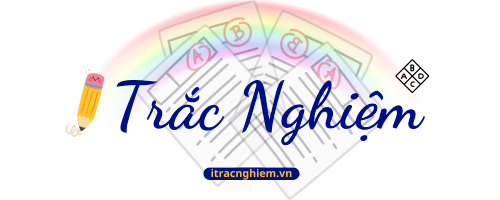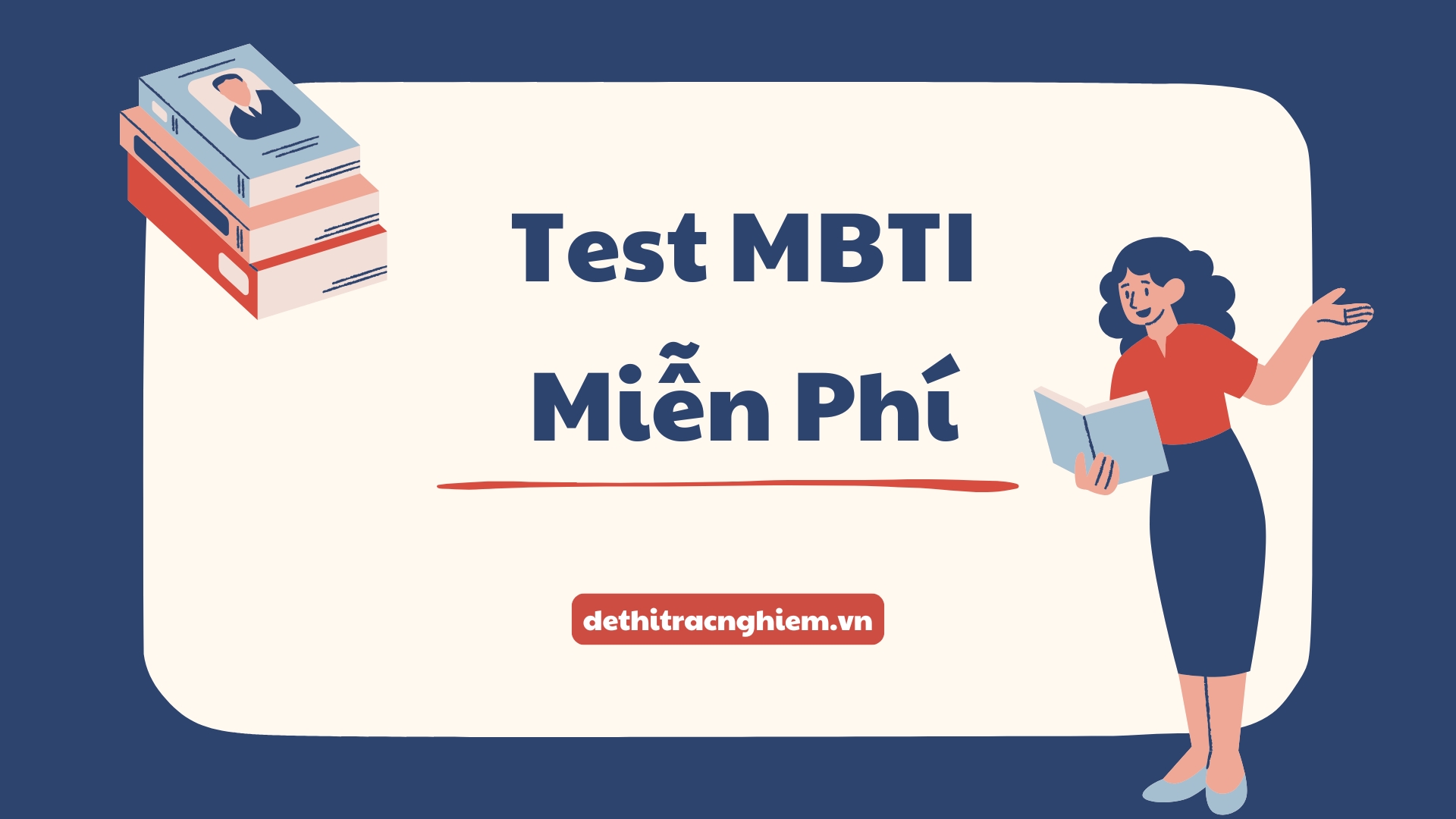Đề thi thử Đại học 2025 môn Tiếng Anh – Khối THPT huyện Cẩm Xuyên – Hà Tĩnh là một trong những đề tiêu biểu thuộc Tổng hợp đề thi thử môn Tiếng Anh THPT QG, nằm trong chương trình Đề thi vào Đại học. Đây là đề thi thử được tổ chức bởi khối các trường THPT trên địa bàn huyện Cẩm Xuyên – tỉnh Hà Tĩnh, nhằm giúp học sinh lớp 12 rèn luyện năng lực làm bài và chuẩn bị vững chắc cho kỳ thi Tốt nghiệp THPT Quốc gia năm 2025.
Đề thi được thiết kế theo đúng cấu trúc đề minh họa của Bộ Giáo dục và Đào tạo, bao gồm đầy đủ các phần trọng tâm như: ngữ âm (phát âm – trọng âm), ngữ pháp – từ vựng, chức năng giao tiếp, tìm lỗi sai, viết lại câu, và đọc hiểu. Với hệ thống câu hỏi phân hóa từ nhận biết đến vận dụng cao, đề thi không chỉ giúp học sinh củng cố kiến thức nền tảng mà còn nâng cao khả năng tư duy ngôn ngữ, phản xạ nhanh và kỹ năng quản lý thời gian khi làm bài.
Hãy cùng Dethitracnghiem.vn khám phá đề thi thử của khối THPT huyện Cẩm Xuyên – Hà Tĩnh và bắt đầu luyện tập ngay hôm nay để chinh phục kỳ thi Tốt nghiệp THPT 2025 một cách tự tin và hiệu quả!
- Số trang: 4 trang
- Hình thức: Trắc nghiệm
- Thời gian làm bài: 50 phút (không kể thời gian phát đề)
ĐỀ THI THỬ ĐẠI HỌC MÔN TIẾNG ANH NĂM 2025 KHỐI THPT HUYỆN CẨM XUYÊN – HÀ TĨNH
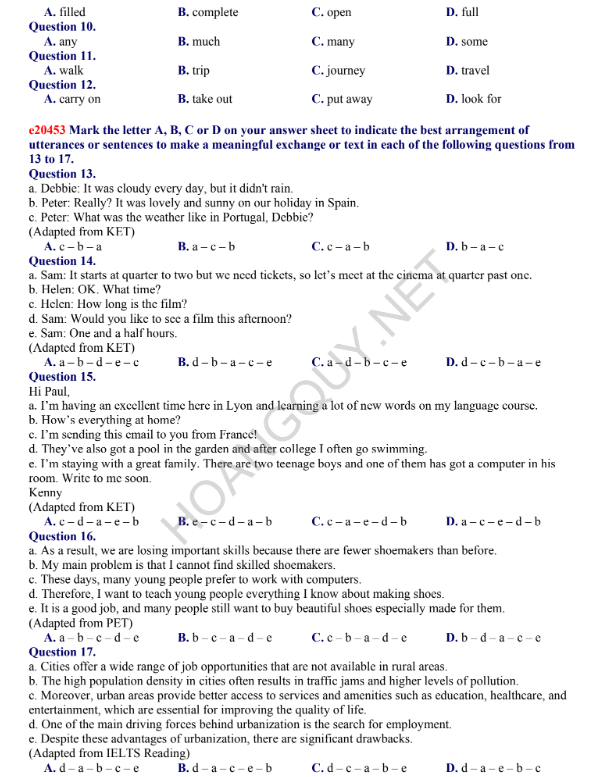
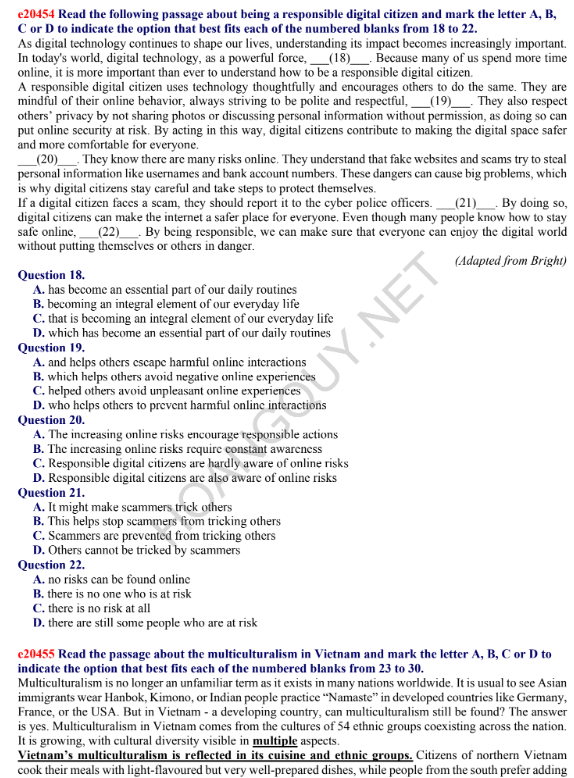
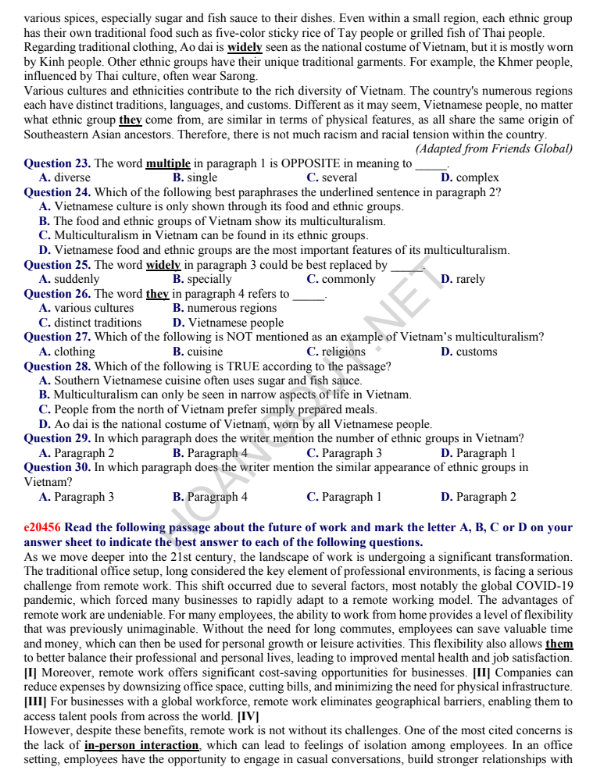
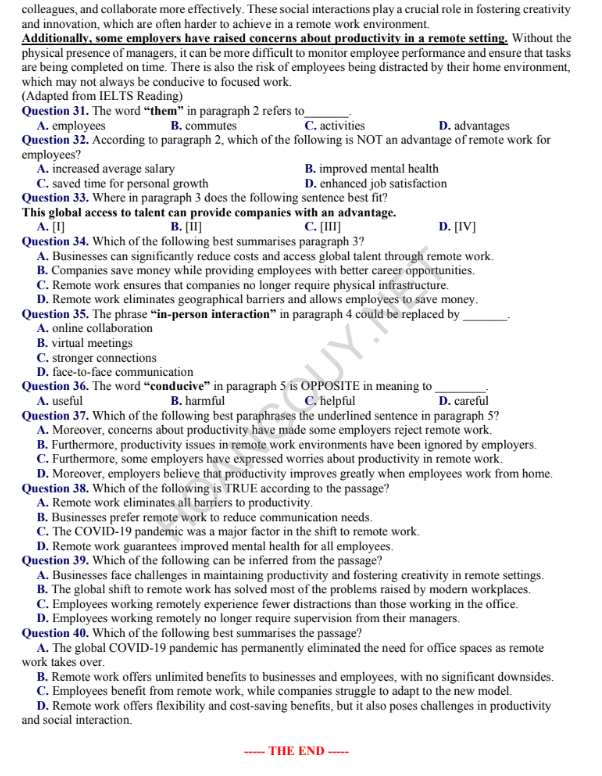
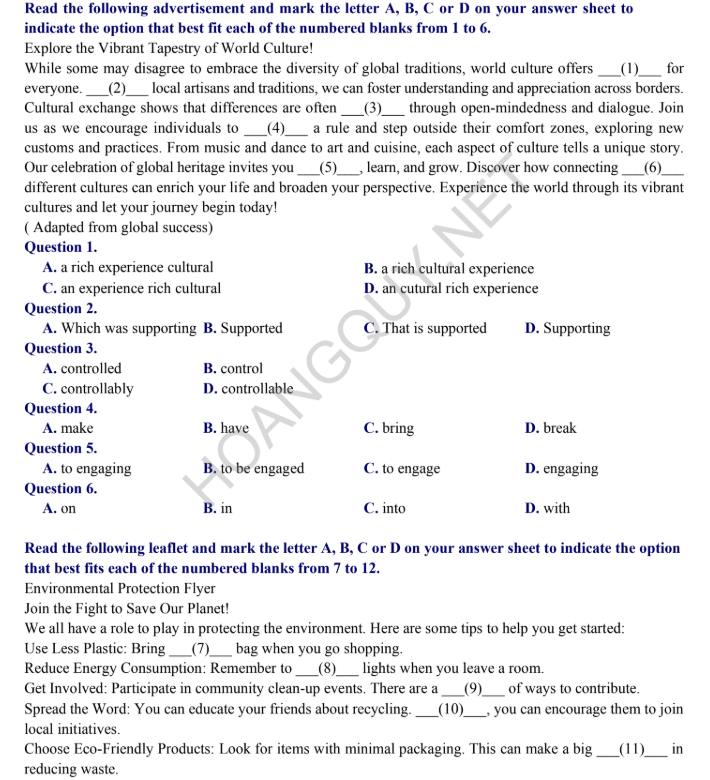
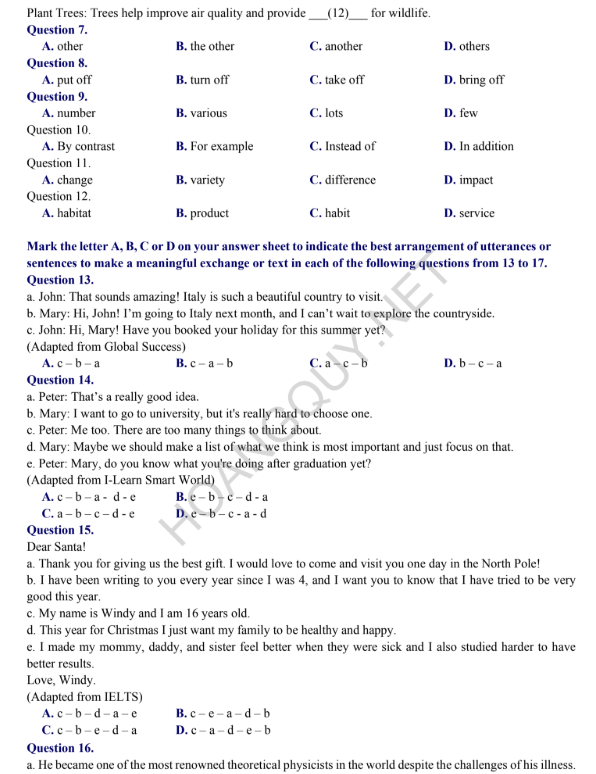
Read the following advertisement and mark the letter A, B, C or D on your answer sheet to indicate the option that best fit each of the numbered blanks from 1 to 6.
Explore the Vibrant Tapestry of World Culture!
While some may disagree to embrace the diversity of global traditions, world culture offers (1) for everyone. (2) local artisans and traditions, we can foster understanding and appreciation across borders. Cultural exchange shows that differences are often (3) through open-mindedness and dialogue. Join us as we encourage individuals to (4) a rule and step outside their comfort zones, exploring new customs and practices. From music and dance to art and cuisine, each aspect of culture tells a unique story. Our celebration of global heritage invites you (5) learn, and grow. Discover how connecting (6) different cultures can enrich your life and broaden your perspective. Experience the world through its vibrant cultures and let your journey begin today!
Question 1:
A. a rich experience cultural
B. a rich cultural experience
C. an experience rich cultural
D. an cultural rich experience
Question 2:
A. Which was supporting
B. Supported
C. That is supported
D. Supporting
Question 3:
A. controlled
B. control
C. controllably
D. controllable
Question 4:
A. make
B. have
C. bring
D. break
Question 5:
A. to engaging
B. to be engaged
C. to engage
D. engaging
Question 6:
A. on
B. in
C. into
D. with
Read the following leaflet and mark the letter A, B, C or D on your answer sheet to indicate the option that best fits each of the numbered blanks from 7 to 12.
Environmental Protection Flyer
Join the Fight to Save Our Planet!
We all have a role to play in protecting the environment. Here are some tips to help you get started:
Use Less Plastic: Bring (7) bag when you go shopping.
Reduce Energy Consumption: Remember to (8) lights when you leave a room.
Get Involved: Participate in community clean-up events. There are a (9) of ways to contribute.
Spread the Word: You can educate your friends about recycling. (10), you can encourage them to join local initiatives.
Choose Eco-Friendly Products: Look for items with minimal packaging. This can make a big (11) in reducing waste.
Plant Trees: Trees help improve air quality and provide (12) for wildlife.
Question 7:
A. other
B. the other
C. another
D. others
Question 8:
A. put off
B. turn off
C. take off
D. bring off
Question 9:
A. number
B. various
C. lots
D. few
Question 10:
A. By contrast
B. For example
C. Instead of
D. In addition
Question 11:
A. change
B. variety
C. difference
D. impact
Question 12:
A. habitat
B. product
C. habit
D. service
Mark the letter A, B, C or D on your answer sheet to indicate the best arrangement of utterances or sentences to make a meaningful exchange or text in each of the following questions from 13 to 17.
Question 13:
a. John: That sounds amazing! Italy is such a beautiful country to visit.
b. Mary: Hi, John! I’m going to Italy next month, and I can’t wait to explore the countryside.
c. John: Hi, Mary! Have you booked your holiday for this summer yet?
A. c – b – a
B. c – a – b
C. a – c – b
D. b – c – a
Question 14:
a. Peter: That’s a really good idea.
b. Mary: I want to go to university, but it’s really hard to choose one.
c. Peter: Me too. There are too many things to think about.
d. Mary: Maybe we should make a list of what we think is most important and just focus on that.
e. Peter: Mary, do you know what you’re doing after graduation yet?
A. e – b – a – d – c
B. e – b – c – d – a
C. a – b – c – d – e
D. e – b – c – d – a
Question 15:
Dear Santa!
a. Thank you for giving us the best gift. I would love to come and visit you one day in the North Pole!
b. I have been writing to you every year since I was 4, and I want you to know that I have tried to be very good this year.
c. My name is Windy and I am 16 years old.
d. This year for Christmas I just want my family to be healthy and happy.
e. I made my mommy, daddy, and sister feel better when they were sick and I also studied harder to have better results.
Love, Windy.
A. c – b – e – d – a
B. c – e – a – d – b
C. c – b – e – d – a
D. c – a – d – e – b
Question 16:
a. He became one of the most renowned theoretical physicists in the world despite the challenges of his illness.
b. Stephen Hawking, diagnosed with ALS at the age of 21, defied the odds.
c. His groundbreaking work on black holes and the universe earned him global respect.
d. What makes his story truly admirable is not only his intellectual achievements but also his determination to continue contributing to science despite being confined to a wheelchair for most of his life.
e. His life reminds us that physical limitations do not define one’s capabilities.
A. b – c – a – e – d
B. b – a – c – d – e
C. b – a – d – c – e
D. b – c – d – a – e
Question 17:
a. There are also many music festivals around the globe that bring artists and music fans together.
b. People nowadays enjoy listening to music from different countries and cultures, and in different languages.
c. Thanks to globalisation, people can quickly discover new music from all over the world.
d. To sum up, in today’s connected world, it is very common for musicians across the world to work on music projects and share ideas together.
e. For example, American teens are captivated by K-pop music and dance.
A. b – d – e – a – c
B. b – c – e – a – d
C. b – a – c – d
D. b – c – c – a – d
Read the following passage about The Journey of Resilience and mark the letter A, B, C or D on your answer sheet to indicate the option that best fit each of the numbered blanks from 18 to 22.
Galileo Galilei, one of the first modern scientists, (18). About twenty years later, he attended the University of Pisa. At first, he studied philosophy, but later he studied mathematics and astronomy. He was interested in the way the earth and other planets move around the sun, (19). He also started a new way of working in science. Before Galileo, scientists did not do experiments. They just guessed about how something happened.
Galileo was different. He did not just make guesses. (20), Galileo was famous for his study of how things fall. He was the first person to do experiments about this problem. Before that, people thought that heavy things always fell faster than light things. He found out that this was not true. He took a heavy ball and a light ball, and he dropped them both from a high place. They fell at the same speed.
This meant that weight is not important. This is the law of falling bodies. (21). The life of the scientist was not always easy in the 1500s. For example, having incredible scientific ideas, (22). His ideas were not the same as the religious ideas at the time. Many religious people did not agree with him. During his whole life, he had to worry about this. He even went to prison for a while.
Question 18:
A. being born in Pisa, Italy, in 1564
B. gave birth in Pisa, Italy, in 1564
C. was born in Pisa, Italy, in 1564
D. who was born in Pisa, Italy, in 1564
Question 19:
A. through which several important facts about our world were found out
B. which led him to discover several important facts about our world
C. making him to find out several important facts about our world
D. whose several important facts about our world were found out
Question 20:
A. He did experiments and watched to see what happened
B. Other scientists helped him do experiments and watched to see what happened
C. Having watched to see what happened, he did experiments
D. Experiments he did contributed to what happened
Question 21:
A. We can understand our world without this important law
B. It is an important law for understanding our world
C. To understand our world, it is an important law
D. It is important to understand our world with an important law
Question 22:
A. Galileo got into trouble
B. Galileo’s life became very hard
C. these made life difficult for Galileo
D. many troubles came to Galileo
Read the following passage and mark the letter A, B, C, or D on your answer sheet to indicate the correct answer to each of the questions from 23 to 30.
One way of training for your future occupation in Germany is by pursuing a dual vocational training programme. Such programmes offer plenty of opportunities for on-the-job training and work experience. Programmes usually last between two and three and a half years and comprise theoretical as well as practical elements. You will spend one or two days a week, or several weeks at once, at a vocational school where you will acquire the theoretical knowledge that you will need in your future occupation.
The rest of the time will be spent at a company. There you get to apply your newly acquired knowledge in practice, for example by learning to operate machinery. You will get to know what your company does, learn how it operates, and find out if you can see yourself working there after completing your training.
This combination of theory and practice gives you a real head start into your job. by the time you have completed your training, you will not only have the required technical knowledge, but you will also have hands-on experience in your job. There are around 350 officially recognised training programmes in Germany, so chances are good that one of them will suit your interests and talents. You can find out which one might be by visiting one of the jobs and vocational training fairs which are organised in many German cities at different times in the year.
Employment prospects for students who have completed a dual vocational training programme are very good. This is one of the reasons why this kind of training is very popular with young Germans, around two thirds of all students leaving school go on to start a vocational training programme.
Question 23: According to the passage, which of the following is NOT mentioned as purposes of dual vocational training programmes?
A. theoretical knowledge
B. technical knowledge
C. interpersonal communication skill
D. practical working experience
Question 24: The word “hands-on” in paragraph 3 is OPPOSITE in meaning to ______.
A. theoretical
B. experimental
C. technical
D. practical
Question 25: The word “it” in paragraph 2 refers to ______.
A. knowledge
B. practice
C. company
D. machinery
Question 26: The word “occupation” in the first paragraph could be best replaced by ______.
A. experience
B. job
C. chance
D. life
Question 27: Which of the following statements best paraphrases the underlined sentence in paragraph 4?
A. Dual vocational training permits every student to get a job after graduation.
B. Graduates of dual vocational training programmes face few challenges in finding employment.
C. School leavers find it easy to get jobs when they possess a dual vocational degree.
D. Job opportunities for those who took a dual vocational training are enormous.
Question 28: Which of the following is TRUE according to the passage?
A. Most German students choose to pursue higher education after school.
B. Dual vocational training is available in all cities in Germany.
C. The duration of a dual vocational training programme is fixed at three years.
D. Students can choose a company that suits their interests and skills for their training.
Question 29: In which paragraph does the writer mention a technical knowledge requirement?
A. Paragraph 3
B. Paragraph 4
C. Paragraph 2
D. Paragraph 1
Question 30: In which paragraph does the writer show the number of high school leavers attending dual vocational training program in Germany?
A. Paragraph 3
B. Paragraph 4
C. Paragraph 2
D. Paragraph 1
Read the following passage about lifelong learning and mark the letter A, B, C, or D on your answer sheet to indicate the best answer to each of the questions from 31 to 40.
[I] Lifelong learning is the ongoing, voluntary, and self-motivated pursuit of knowledge for personal or professional development (Knowles, 2020). [II] This concept emphasizes that learning does not stop after formal education, but rather continues throughout an individual’s life, adapting to changing circumstances and needs. [III] In today’s fast-paced world, where technology and job markets evolve rapidly, lifelong learning has become increasingly essential. [IV]
One of the primary benefits of lifelong learning is its ability to enhance employability. Individuals who engage in continuous education are more likely to keep their skills relevant and competitive in the job market. According to a report by the World Economic Forum (2021), over 50% of employees will need reskilling due to technological advancements in the coming years. Lifelong learners are better equipped to adapt to these changes, making them more attractive candidates for employers.
Moreover, lifelong learning contributes to personal fulfillment and mental well-being. Engaging in new learning experiences can stimulate the brain, foster creativity, and improve cognitive function. Research indicates that individuals who pursue learning opportunities throughout their lives tend to report higher levels of happiness and life satisfaction (Smith & Johnson, 2019). Whether it is taking a course, learning a new language, or picking up a new hobby, the process of acquiring knowledge can be enriching and enjoyable. In addition, lifelong learning promotes social engagement and community involvement. Participating in educational programs or community workshops can foster connections with others who share similar interests. This social aspect of learning can enhance one’s sense of belonging and support networks, which are crucial for mental health (Jones, 2022).
Overall, lifelong learning is not just an individual responsibility; it requires support from educational institutions, employers, and communities to create an environment conducive to continuous education. By fostering a culture of learning, society can better prepare individuals for the challenges of the future and ensure that everyone has the opportunity to thrive.
Question 31: Where in paragraph 1 does the following sentence best fit? “Lifelong learning encourages individuals to embrace new skills and knowledge throughout their lives.”
A. [I]
B. [II]
C. [III]
D. [IV]
Question 32: The phrase “self-motivated pursuit” in paragraph 1 could be best replaced by ______.
A. voluntary quest for
B. external pressure to learn
C. obligatory education
D. structured learning environment
Question 33: The word “who” in paragraph 2 refers to ______.
A. ability
B. individuals
C. benefits
D. employability
Question 34: According to paragraph 2, which of the following is NOT a benefit of lifelong learning?
A. Adapting to technological changes
B. Enhancing employability
C. Keeping skills relevant
D. Guaranteeing job security
Question 35: Which of the following best summarizes paragraph 3?
A. Lifelong learning has a positive impact on cognitive function and mental well-being, leading to greater happiness and life satisfaction.
B. Learning should only occur in formal educational settings.
C. Research shows that lifelong learning only improves mental health in certain individuals.
D. Taking courses and learning new skills is essential for career advancement and professional success.
Question 36: The word “fulfillment” in paragraph 3 is OPPOSITE in meaning to ______.
A. achievement
B. disappointment
C. success
D. satisfaction
Question 37: Which of the following is TRUE according to the passage?
A. Educational institutions have no role in promoting lifelong learning.
B. Lifelong learning primarily benefits young individuals.
C. Social engagement is not related to educational programs.
D. Continuous education can improve one’s mental health and sense of belonging.
Question 38: Which of the following best paraphrases the underlined sentence in paragraph 4?
A. Individuals alone are responsible for their educational journeys throughout life.
B. Lifelong learning is not important for personal or professional growth.
C. Communities and institutions play a crucial role in supporting lifelong learning initiatives.
D. Individuals should pursue lifelong learning independently without any external help.
Question 39: Which of the following can be inferred from the passage?
A. Technology has no influence on the necessity for lifelong learning.
B. People who do not engage in lifelong learning are likely to be happier.
C. Lifelong learning is an unnecessary practice in today’s job market.
D. Continuous education can lead to increased job opportunities and career advancements.
Question 40: Which of the following best summarizes the passage?
A. Lifelong learning plays a crucial role solely in adapting to technological changes in the workforce.
B. Lifelong learning boosts career prospects, personal well-being, and social involvement.
C. Lifelong learning primarily aims at enhancing intellectual growth and personal well-being.
D. Lifelong learning is primarily about formal education and does not affect social engagement.
Mục đích tổ chức kỳ thi Đại học năm 2025 là gì?
Căn cứ theo quy chế hiện hành của Bộ Giáo dục và Đào tạo và các văn bản hướng dẫn tổ chức kỳ thi Đại học năm 2025, mục đích của kỳ thi là:
– Đánh giá kết quả học tập của học sinh sau 12 năm học theo yêu cầu của chương trình giáo dục phổ thông.
– Lấy kết quả thi để xét công nhận tốt nghiệp trung học phổ thông và làm căn cứ tuyển sinh đại học, cao đẳng.
– Góp phần đánh giá chất lượng giáo dục của địa phương và cả nước, làm cơ sở điều chỉnh nội dung, phương pháp dạy học trong nhà trường.
Thí sinh thi Đại học năm 2025 có bắt buộc thi môn Tiếng Anh không?
Theo quy định hiện hành của Bộ Giáo dục và Đào tạo và hướng dẫn tổ chức kỳ thi tốt nghiệp Đại học năm 2025, thí sinh dự thi phải thực hiện như sau:
– Thi 3 môn bắt buộc: Toán, Ngữ văn và Ngoại ngữ.
– Ngoài ra, thí sinh phải chọn một trong hai bài thi tổ hợp: Khoa học Tự nhiên (gồm các môn Vật lí, Hóa học, Sinh học) hoặc Khoa học Xã hội (gồm các môn Lịch sử, Địa lí, Giáo dục công dân – dành cho học sinh học chương trình giáo dục phổ thông).
Trong số các môn thi, Tiếng Anh là một trong ba môn thuộc bài thi Ngoại ngữ bắt buộc, thí sinh phải thi môn Tiếng Anh như một môn bắt buộc, không phụ thuộc vào lựa chọn bài thi tổ hợp hay mục đích xét tuyển đại học.
Như vậy, kỳ thi Đại học năm 2025 bắt buộc thí sinh phải thi môn Tiếng Anh.
